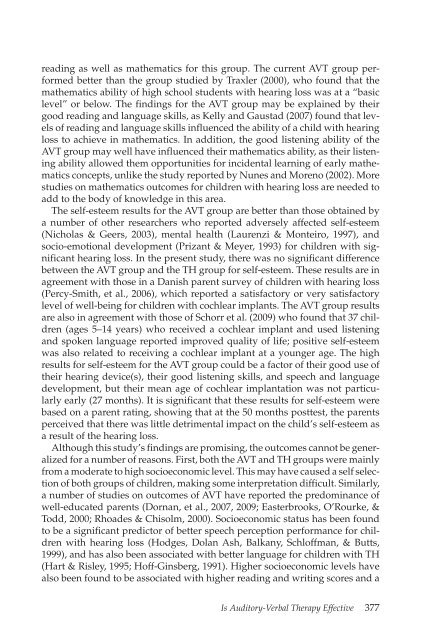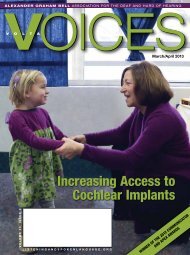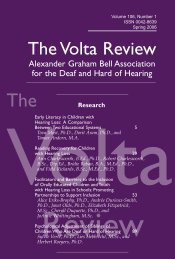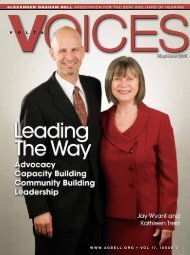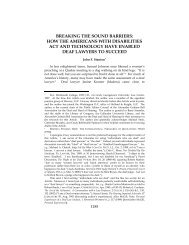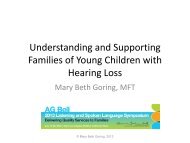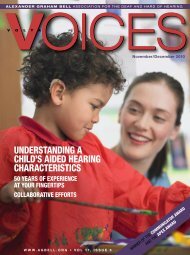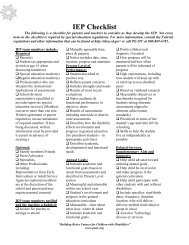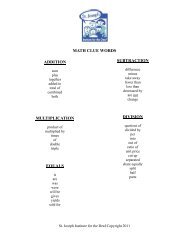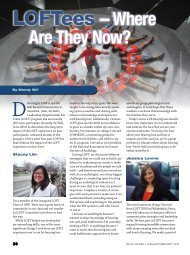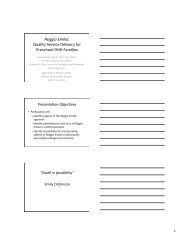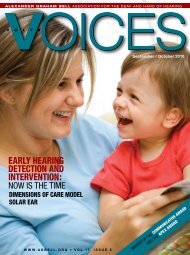Download this issue - Alexander Graham Bell Association
Download this issue - Alexander Graham Bell Association
Download this issue - Alexander Graham Bell Association
You also want an ePaper? Increase the reach of your titles
YUMPU automatically turns print PDFs into web optimized ePapers that Google loves.
eading as well as mathematics for <strong>this</strong> group. The current AVT group performed<br />
better than the group studied by Traxler (2000), who found that the<br />
mathematics ability of high school students with hearing loss was at a “basic<br />
level” or below. The findings for the AVT group may be explained by their<br />
good reading and language skills, as Kelly and Gaustad (2007) found that levels<br />
of reading and language skills influenced the ability of a child with hearing<br />
loss to achieve in mathematics. In addition, the good listening ability of the<br />
AVT group may well have influenced their mathematics ability, as their listening<br />
ability allowed them opportunities for incidental learning of early mathematics<br />
concepts, unlike the study reported by Nunes and Moreno (2002). More<br />
studies on mathematics outcomes for children with hearing loss are needed to<br />
add to the body of knowledge in <strong>this</strong> area.<br />
The self-esteem results for the AVT group are better than those obtained by<br />
a number of other researchers who reported adversely affected self-esteem<br />
(Nicholas & Geers, 2003), mental health (Laurenzi & Monteiro, 1997), and<br />
socio-emotional development (Prizant & Meyer, 1993) for children with significant<br />
hearing loss. In the present study, there was no significant difference<br />
between the AVT group and the TH group for self-esteem. These results are in<br />
agreement with those in a Danish parent survey of children with hearing loss<br />
(Percy-Smith, et al., 2006), which reported a satisfactory or very satisfactory<br />
level of well-being for children with cochlear implants. The AVT group results<br />
are also in agreement with those of Schorr et al. (2009) who found that 37 children<br />
(ages 5–14 years) who received a cochlear implant and used listening<br />
and spoken language reported improved quality of life; positive self-esteem<br />
was also related to receiving a cochlear implant at a younger age. The high<br />
results for self-esteem for the AVT group could be a factor of their good use of<br />
their hearing device(s), their good listening skills, and speech and language<br />
development, but their mean age of cochlear implantation was not particularly<br />
early (27 months). It is significant that these results for self-esteem were<br />
based on a parent rating, showing that at the 50 months posttest, the parents<br />
perceived that there was little detrimental impact on the child’s self-esteem as<br />
a result of the hearing loss.<br />
Although <strong>this</strong> study’s findings are promising, the outcomes cannot be generalized<br />
for a number of reasons. First, both the AVT and TH groups were mainly<br />
from a moderate to high socioeconomic level. This may have caused a self selection<br />
of both groups of children, making some interpretation difficult. Similarly,<br />
a number of studies on outcomes of AVT have reported the predominance of<br />
well-educated parents (Dornan, et al., 2007, 2009; Easterbrooks, O’Rourke, &<br />
Todd, 2000; Rhoades & Chisolm, 2000). Socioeconomic status has been found<br />
to be a significant predictor of better speech perception performance for children<br />
with hearing loss (Hodges, Dolan Ash, Balkany, Schloffman, & Butts,<br />
1999), and has also been associated with better language for children with TH<br />
(Hart & Risley, 1995; Hoff-Ginsberg, 1991). Higher socioeconomic levels have<br />
also been found to be associated with higher reading and writing scores and a<br />
Is Auditory-Verbal Therapy Effective 377


